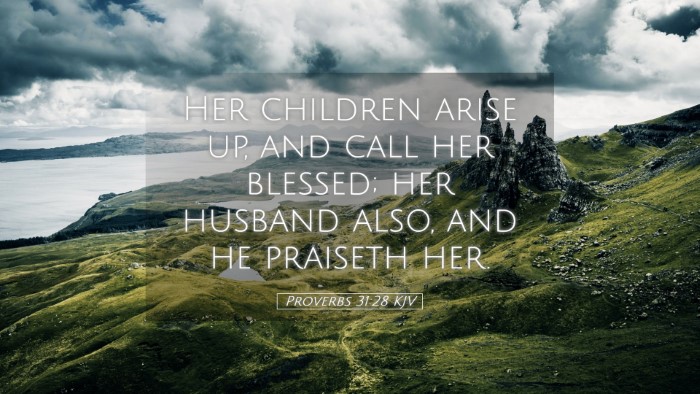Proverbs 31:28 Commentary
Verse: "Her children arise up, and call her blessed; her husband also, and he praiseth her."
Introduction
Proverbs 31 is often regarded as a celebration of the virtuous woman. This final chapter of the book of Proverbs provides not only wisdom in daily living but also insight into the nature of a godly family. Verse 28 specifically draws attention to the recognition and honor that a virtuous woman receives from her children and husband. Below, we will draw from the insights of Albert Barnes, Matthew Henry, and Adam Clarke to explore the depth of this verse.
Exegesis of the Verse
This verse encapsulates the essence of familial respect and admiration. The children "arise up" suggests a spontaneous expression of reverence and acknowledgment of the mother's character and influence in their lives. The word "blessed" signifies not merely a temporal appreciation but also a divinely recognized role filled with honor.
Children’s Response
1. Spontaneous Respect: The act of arising indicates immediate respect and admiration. It reflects a posture of reverence that is culturally significant, reminiscent of other Biblical instances where standing is a sign of honor (cf. 1 Kings 1:16).
2. Teaching and Influence: The children's calling her "blessed" points to a shared understanding of the mother's impact on their upbringing. The values instilled in them by their mother reflect a lasting legacy of virtue.
Husband’s Praise
1. Acknowledgment of Virtue: The husband’s praise underscores the communal acknowledgment of the wife’s efforts. As Adam Clarke notes, the husband’s role in praising reinforces the importance of verbal affirmation within the family structure.
2. Reflection of Christ and the Church: This dynamic mirrors the relationship between Christ and the Church, where Christ affectionately cherishes the Church's virtues (Ephesians 5:25-27).
Theological Implications
This verse implicates a larger theological narrative regarding familial roles and virtues. The virtuous woman is celebrated not purely for her duties but her character, illustrating a profound connection between personal integrity and communal appreciation.
Principles for Pastoral Application
- Modeling Respect: Pastors should encourage families to model respect and admiration, reflecting the behavior outlined in Proverbs 31:28.
- Promoting Healthy Relationships: Emphasize the importance of familial relationships built on mutual respect and praise.
- Building a Culture of Affirmation: Encourage a culture where children are taught to express gratitude towards their parents, establishing a legacy of respect.
Insights from Commentators
Matthew Henry
Matthew Henry stresses the importance of recognizing the labor and love that mothers invest in their families. He suggests that when children honor their mothers, they fulfill a divine commandment, reflecting on the importance of acknowledging parental contributions to one’s life journey.
Albert Barnes
Barnes emphasizes the fidelity and industriousness of the virtuous woman. He points out that genuine praise from children and husbands hinges on the character traits displayed through consistent actions and life. His commentary advocates for an understanding that praise should arise from witnessing the fruits of a mother’s labor.
Adam Clarke
Adam Clarke provides a nuanced view by interpreting the familial dynamic established through the mother’s virtues. He indicates that without acknowledgment and praise, the family unit may falter in its recognition of divine order and roles. He addresses the necessity of actively seeking to honor one's mother as a reflection of God’s character.
Concluding Thoughts
Proverbs 31:28 serves as a poignant reminder of the intrinsic value of recognizing and honoring the virtues of women, specifically within the family. The praise rendered by children and husbands is not merely a tradition; it is a sacred duty that reflects the workings of God’s grace within familial relationships. As we encourage the churches and communities to uphold these values, we reinforce the notion that respect and praise are foundational to godly living and fostering healthy relational dynamics.


